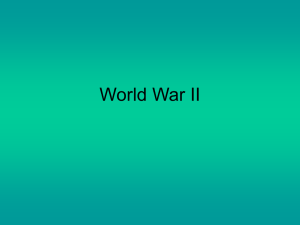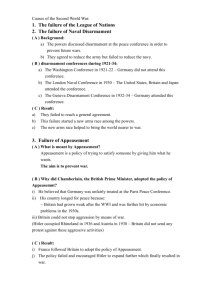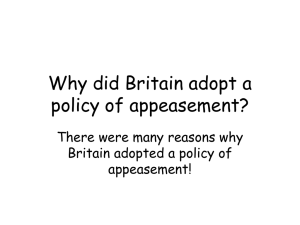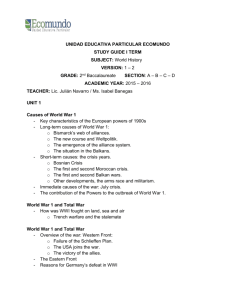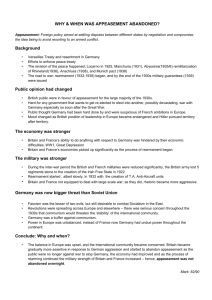What is Appeasement?
advertisement
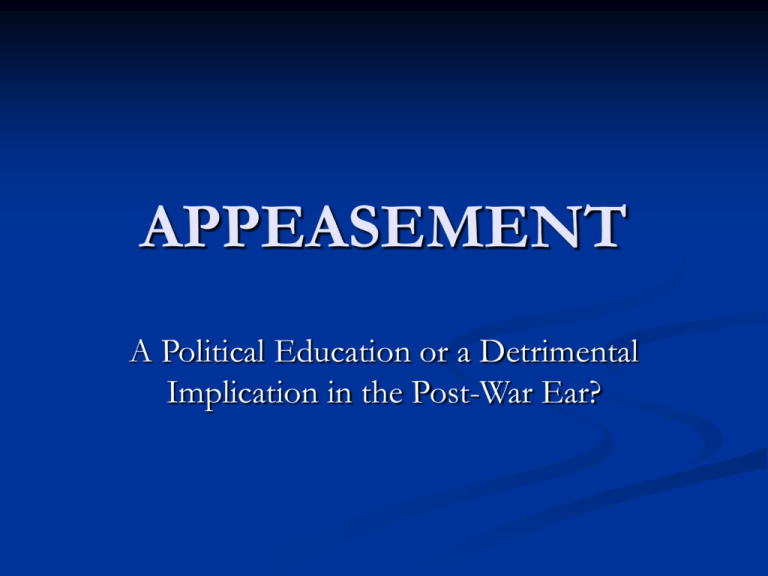
APPEASEMENT A Political Education or a Detrimental Implication in the Post-War Ear? Overview What is Appeasement? Sections of Research and Analysis Impact of Appeasement Why is this Topic Important to Study? Project Form What is Appeasement? Appeasement has been defined as: “Giving in to the demands of aggressive powers to avoid war” “The policy of pacifying an aggressive nation in the hopes of avoiding further conflict” “A policy of making concessions to an aggressor in hopes of avoiding war” What is Appeasement? During the 1930’s, Britain and France adopted a policy of appeasement towards Adolf Hitler and Nazi Germany, offering the menacing dictator numerous concessions in the hope of avoiding a conflict reminiscent of WW1 The climax of appeasement occurred at the Munich Conference in 1938 when Britain and France granted the Germans permission to What is Appeasement? Allowed Hitler the opportunity to transform Germany into a war machine and gain control over Central Europe without a fight Appeasement failed, eventually leading to World War 2, the most devastating conflict of our time, which resulted in an estimated 56 – 61 million deaths What is Appeasement? •The Legacy of appeasement •The leaders during this timer period, such as Neville Chamberlain, have been scorned and ridiculed throughout history, receiving considerable blame for the outbreak of war. Is this fair? •The west openly sacrificed nations in Eastern Europe to avoid war with Hitler. Did this influence the attitudes and actions of the Soviet Union at the end of the war? Sections of Research Historiography and general theories regarding the policy of appeasement An analysis and description of the policy of appeasement in Britain and France throughout the 1930’s The role of the Soviet Union during this time period, analyzing their reactions to the appeasement of Nazi Germany Historiography Traditional Theory – belief that the policy of appeasement was merely an attempt on behalf of Britain and France to save themselves by offering other nations to Germany “How horrible, fantastic, incredible it is that we should be digging trenches and trying on gas-masks here because of a quarrel in a far-away country between people of whom we know nothing!” – Neville Chamberlain, 1938 Historiography Revisionist Theory – more sympathetic towards Britain and France, arguing that they were fighting to maintain their dieing empires while simultaneously attempting to reinstate a “balance-of-power” system throughout Europe, excluding the Soviet Union Analysis and Description Britain and France An in-depth analysis and description of the causes, motivations, political actions and reactions, discussions, debates and political policies of Britain and France during appeasement Includes heads of state, government officials, ambassadors, foreign ministers, politicians, and most importantly, ordinary citizens Inability of the capitalist west and communist east to cast aside their differences and come to an agreement to in order to counter Hitler Role of the Soviet Union Hitler’s regime was fanatically anticommunist, anti-Slavic, and anti-Semitic. His plans for world domination were oriented towards the east, something the Soviet Union was well aware of during his ascendancy to power Role of the Soviet Union •What was the Soviet Union’s response to the West’s policy of appeasement towards Hitler’s Nazi Germany? •Did the attitudes maintained by Western European nations during this time period influence the Cold War? Impact of Appeasement Following the end of World War 2, the United States formulated its foreign policy based in accordance with the lessons the world had learned from the policy of appeasement during the 1930’s. As a result, the U.S. adapted an aggressive policy of action to prevent the failures of appeasement from reoccurring The effects of appeasement on U.S. foreign policy has been apparent for several decades, and is still influencing diplomatic decisions in today’s world An example of the U.S. anti-appeasement policy is the Vietnam War Why is this Subject Important to Study? Prior to the outbreak of war with Iraq in 2002, politicians, government officials, and numerous TV analysts compared Saddam Hussein with Adolf Hitler, warning against the dangers of “appeasing” him Why is this Subject so Important to Study? “History proved that Churchill was right. If the appeasers of our own day are wrong, then Saddam Hussein continues Hitler’s quest to eradicate the world of Jews and terrorize the planet with the threat of, now, nuclear annihilation. The United States is the only country that CAN stop Saddam Hussein before that terrifying possibility becomes a horrific, unstoppable reality.” Why is this Subject so Important to Study? “Hussein is the brute that threatens not only his continent, but the entire civilized world. And after two world wars, one would expect the public’s reaction to [the] unprovoked attacks on New York and Washington to elicit an appropriately autonomic response of no less than pre-emptive self-defense against the source of those attacks. But, quite the contrary, there is a growing peace movement in Europe, Canada and the United States calling for ‘temperance,’ ‘patience’ and yes, even appeasement of Saddam Hussein. Why is this Subject Important to Study? Studying appeasement is essential to the problems that will inevitably arise in the future History teaches us lessons, providing us with the opportunity to analyze certain scenarios that have presented themselves Does the legacy of appeasement still impact the diplomacy, foreign policy and international relations of the United States? Is the policy of appeasement justifiably comparable to the events in today’s world? What Will This Project Look Like? After a period of extensive research and detailed analysis, this project will take the form of a polished and in-depth research paper This project can be accomplished at UNCW A wealth of primary and secondary source material pertaining to this subject is available at Randall Library. This includes memoirs, microfilm, personal letters, testimonies, diaries, official correspondences, state and government documents
